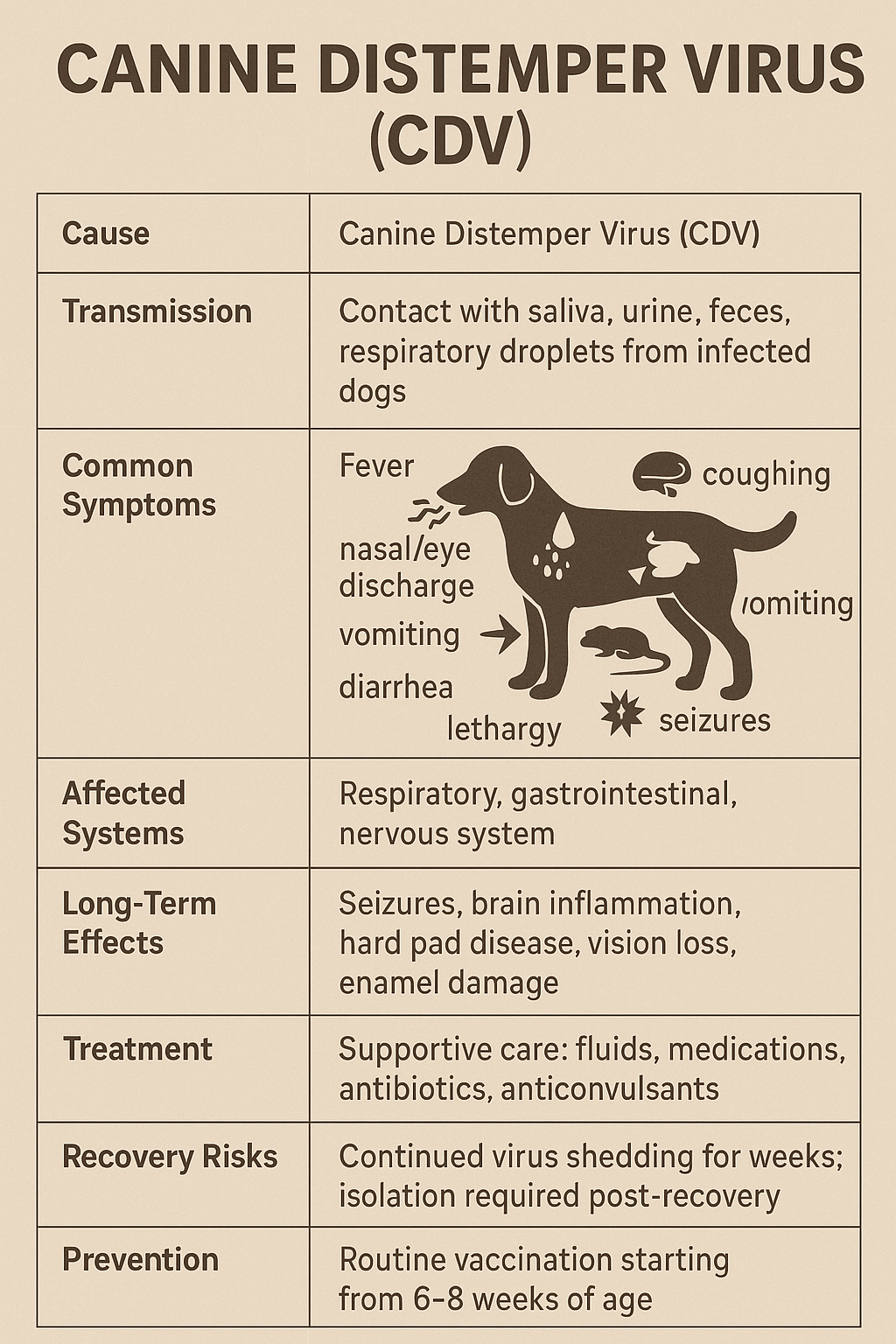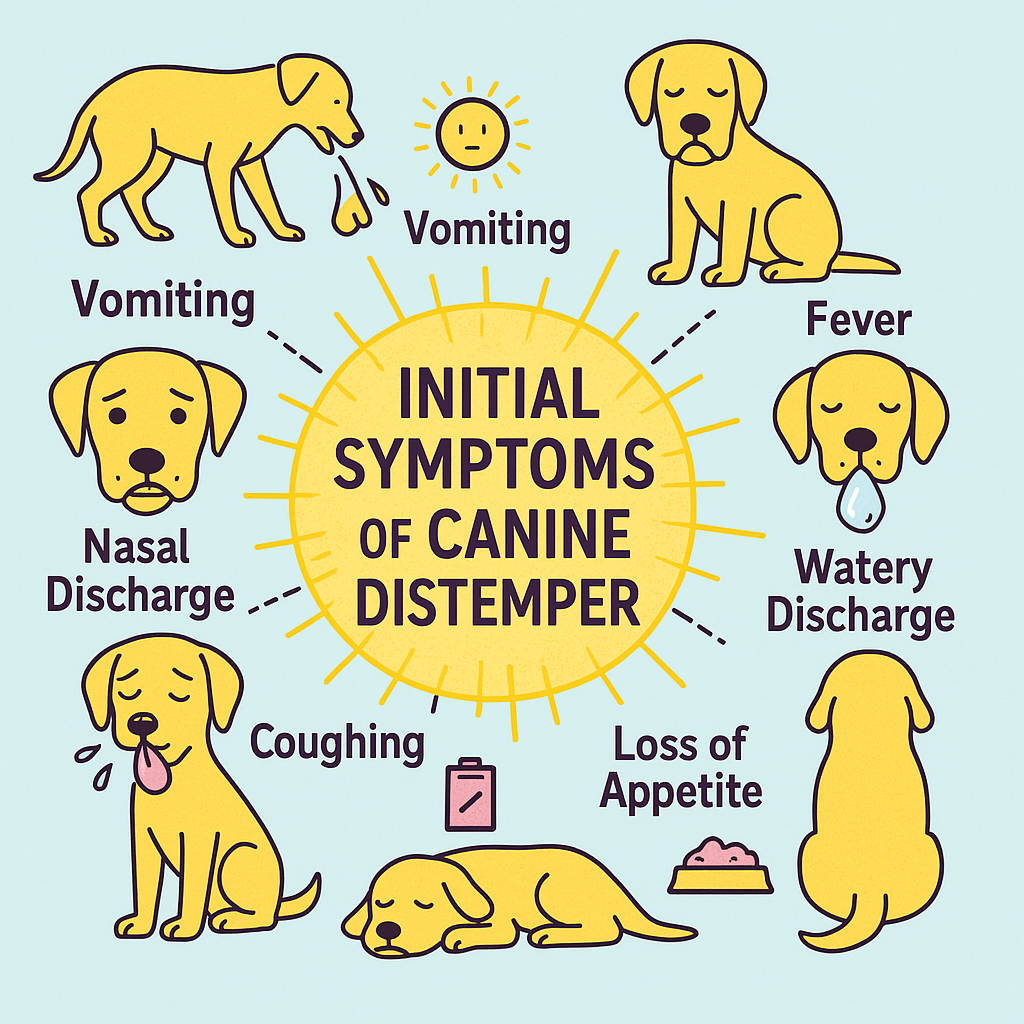Canine distemper is a highly infectious and frequently deadly viral disease that targets a dog's respiratory, gastrointestinal, and nervous systems. It is caused by the canine distemper virus (CDV) and is most lethal for puppies, unvaccinated animals, and immunocompromised animals.
How Canine Distemper Spreads
Transmission is mostly through direct contact with contaminated body fluids, for example, saliva, urine, and respiratory droplets. It is contracted by dogs through sharing food bowls, licking one another, or coming in contact with sneezes or coughs from an affected dog. A dog can pass the virus even after it appears to have recovered for several weeks, so isolation is necessary during and following recovery to avoid an outbreak.
Symptoms of Canine Distemper
The initial symptoms of infection can be similar to other regular illnesses, so pet owners need to remain alert. Some of the common symptoms are:
- Fever
- Nasal and eye discharge
- Coughing
- Vomiting and diarrhea
- Lethargy
- Loss of appetite
- Neurological symptoms like head tilt, seizures, muscle twitching, and imbalance

Related Health Complications
If left untreated, canine distemper can result in severe long-term complications, including:
- Encephalitis (inflammation of the brain)
- Permanent damage to the nervous system
- Pneumonia or chronic bronchitis
- Severe malnutrition and dehydration
- Thickened paw pads and nose skin (hard pad disease)
- Tooth damage and enamel destruction in puppies
- Vision loss and retinal damage
Surviving dogs may continue to have neurological tics or seizures months or even years following recovery.
Treatment Options
Supportive therapy cannot cure the distemper virus itself, but it can greatly enhance chances of survival. Treatment aims at:
- IV fluids to provide hydration
- Anti-nausea and anti-diarrheal medications
- Antibiotics to protect from secondary bacterial infections
- Anticonvulsants for seizures
- Nutritional support and warmth
Veterinary treatment should start as soon as the symptoms arise, and the affected dogs need to be kept isolated from other animals at once.
Prevention: Vaccination is Vital
Vaccination is the ultimate protection. Puppies need to start their series of vaccinations between 6–8 weeks, with booster shots thereafter. Adult dogs need to be kept updated too with booster shots annually or every three years.
Keeping away from stray, ill, or unvaccinated dogs, particularly in public places, is essential until your dog is completely immunized.
Final Thoughts
Canine distemper is still one of the most lethal infectious canine diseases. Prevention is essential due to its high mortality rate and long-term complication potential. Through vaccination, awareness of early symptoms, and quarantining infected dogs, owners can be an important part of preventing its spread.
Frequently Asked Questions (FAQs)
1. Can dogs recover from canine distemper?
2. Is canine distemper contagious to humans?
3. A dog can be contagious for how long after recovering from distemper?
4. Can a vaccinated dog develop distemper?
5. What is <strong>hard pad</strong> disease?
6. Is distemper the same as parvo?
7. How is distemper diagnosed?
8. Can my dog get distemper more than once?
9. Can indoor dogs get distemper?
10. Is there risk to other pets?

About SniffnTail
SniffnTail is your go-to destination for everything pets. From helpful advice, tips, and insights to thoughtfully selected products and resources, we’re here to support pet owners at every stage of their journey. Whether you're caring for a playful pup, a wise old cat, or anything in between, SniffnTail offers tools and knowledge to make pet parenting easier and more joyful.
Related Articles
 Health & Wellness • 6 min read
Health & Wellness • 6 min readWhat Bright Red Gums in Dogs Really Mean: Inflammation, Infection, or Heatstroke?
Wondering why your dog’s gums are suddenly bright red? Learn about dog gum color health, red gums in dogs, and how to recognize signs of inflammation, infection, or heatstroke.
 Health & Wellness • 6 minutes
Health & Wellness • 6 minutesThe Link Between Bad Dog Breath and Dental Disease
Discover how bad dog breath is more than a nuisance—it's a sign of potential dog dental disease. Learn symptoms, causes, and what pet parents can do to protect their dog's oral health.
 Health & Wellness • 7 min read
Health & Wellness • 7 min readLabrador Retriever Separation Anxiety: The Social Dog's Challenge
Discover how to manage Labrador Retriever separation anxiety, rooted in pack mentality and deep family bonding. Expert tips for easing stress in this loving breed.

